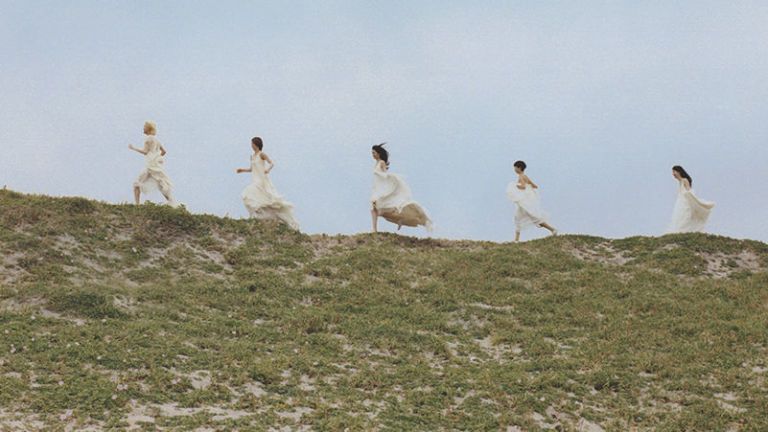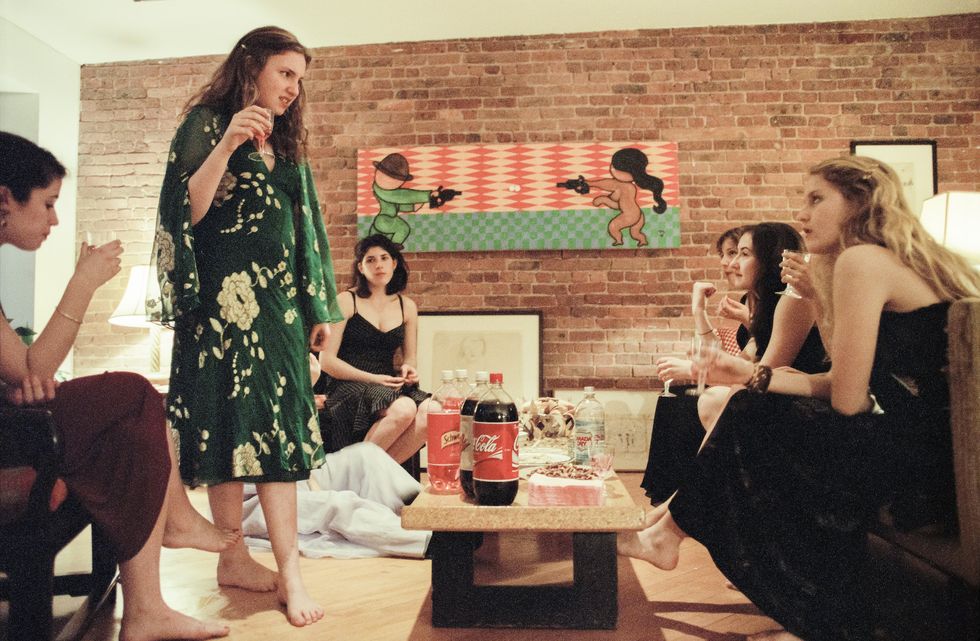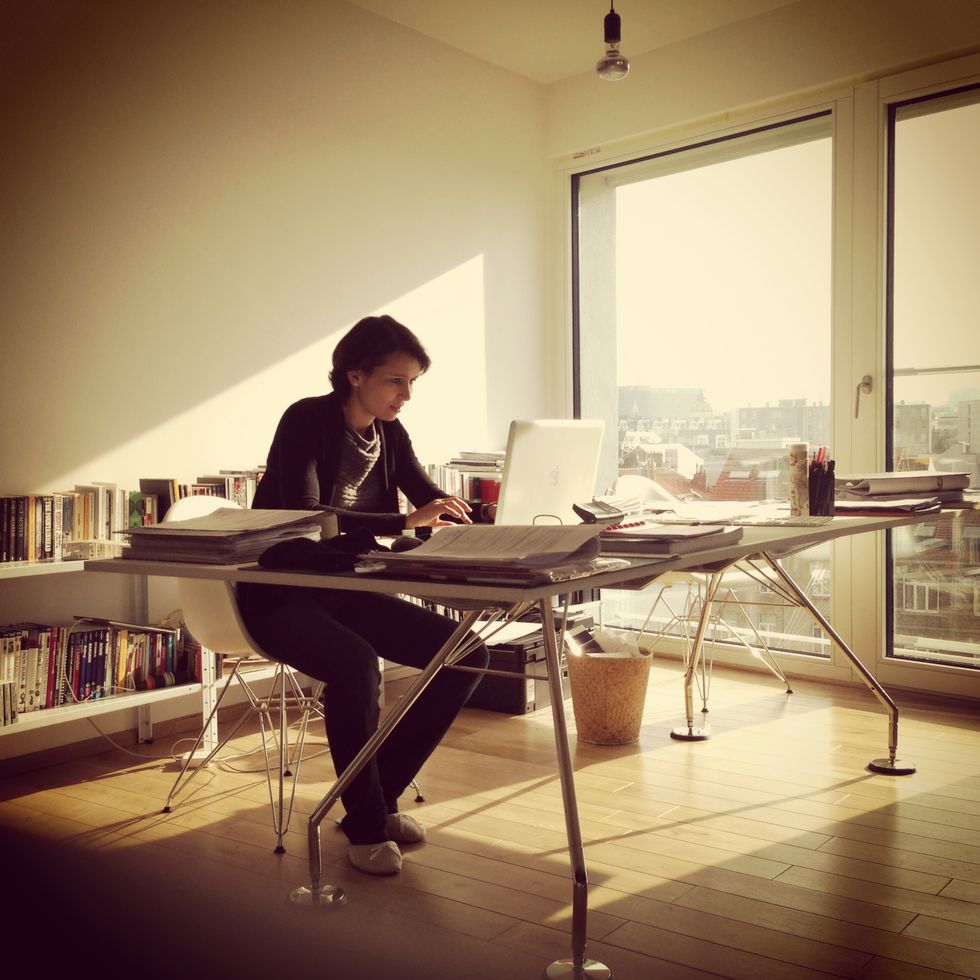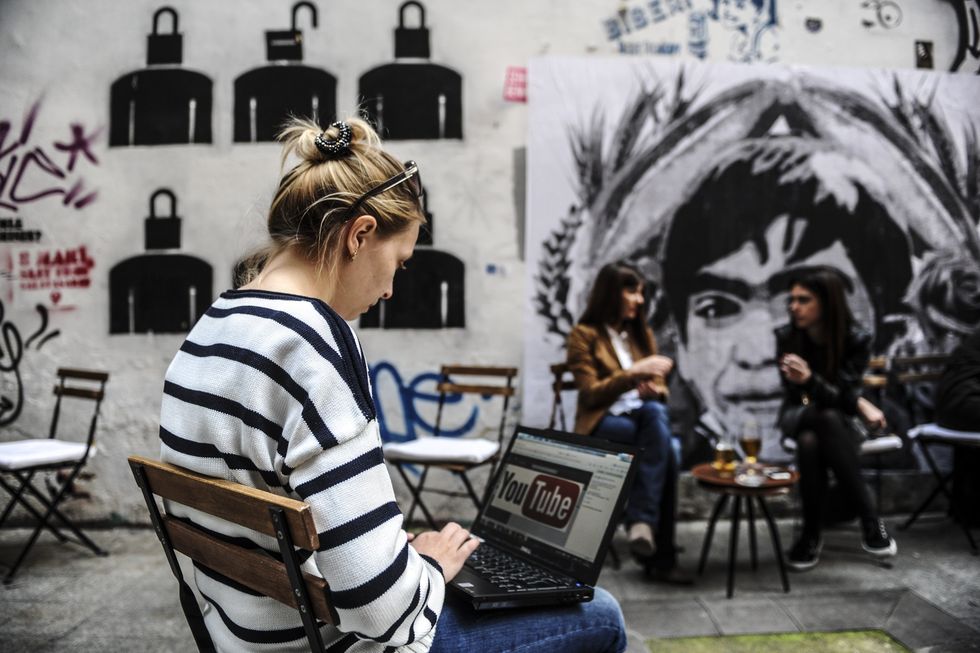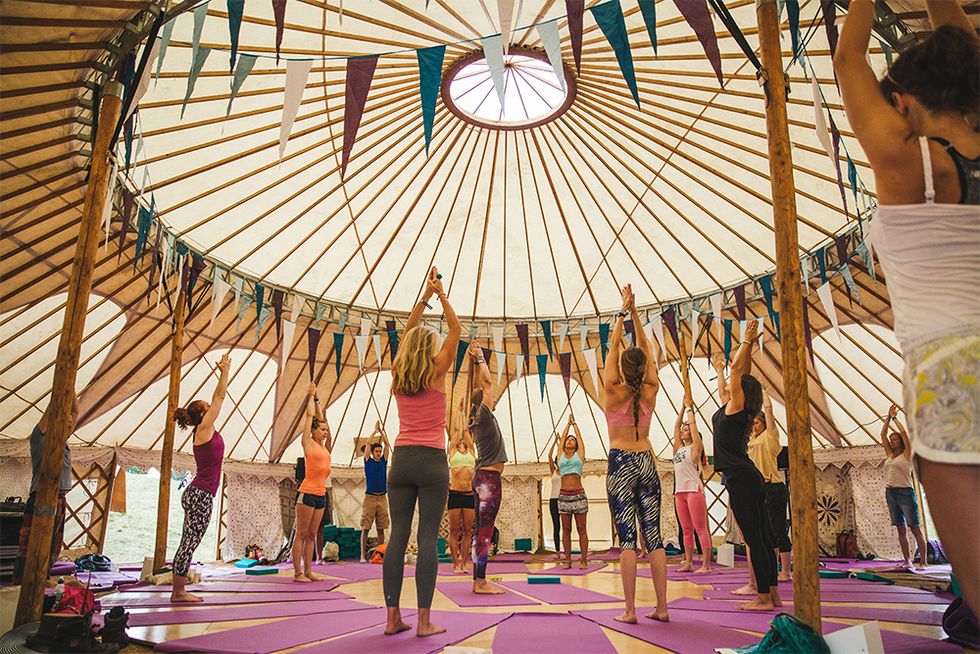I'm really glad I wore a smart pair of socks on the day of my first women-only meeting. I'd been invited to a talk on 'How to Seize the Moment in the New Year' by The Sorority, a private society in London for professional women.
When I arrive at the apartment of astrologer Shelley von Strunckel, who hosts the annual event in Kings Cross, it's clear the polished wooden floors are too high risk for the heeled boots and stiletto courts now abandoned by the door. So we're all standing, sipping champagne in our socks, and somehow the glossy atmosphere is far more democratic. Tonight, we're all shoeless sisters.
The Sorority's 130-strong membership, which is invite-only, includes entrepreneurs, TV presenters such as Katie Derham, and Saudi princesses. It was founded in 2010 by businesswoman Lisa Tse and is based on the conviction that 'there has always been a certain spark [...] in the connections and conversations women have with other women. It's hard to define, even mysterious. It's a spark you will only recognise having experienced it.'
I'm pretty sure I experience my first spark early on in the evening.
After being welcomed by Lisa, I'm immediately sucked into a conversation between an interior designer and a famous film director, which ranges from masticating juicers to Chinese numerology.
The latter inspires the director to reach into her bra and take out two bits of paper, each with a Chinese symbol. She explains how she's been told to keep them close to her chest at all times by her Baker Street health guru. As she slips them back into her bra, I can't help but think I'm witnessing behaviour that wouldn't happen if there were a man in our presence. Despite my reservations that my first women-only event might be a bit, well, cringe-inducing, I'm having a lot of fun. The next day, I even start using the 'goal digger' notebook we were given at the end of the evening. It makes me laugh – at myself.
This kind of no-boys-allowed gathering is happening more and more, gaining traction among professional women who, by all accounts, want to feel free and have a break from an often male-dominated working culture.
Why Would You Want A 'Women Only' Space?
At a time when the fight for gender equality is stronger and more dynamic than ever, and traditional boys' clubs are on the decline, why do we feel the need to spend time in women-only spaces? If it's equality we want, shouldn't we be furthering the feminist cause by sharing our opinions, work habits and life aspirations with those who need to be exposed to it the most – men?
In New York's Flatiron District, one of Lena Dunham's best friends, political consultant Audrey Gelman, opened a women-only co-working hub and social club called The Wing.
The 'millennial-meets-suffragette space', which can host 200 women, has a beauty area and a lactation room. It launched in autumn 2016 with a slumber party, where guests Instagrammed themselves frolicking in monogrammed pyjamas; and founding members include trans-model Hari Nef and J.Crew president Jenna Lyons. And yes, there were pillow fights. When I ask Audrey whether women-only spaces such as The Wing (which is strictly no boys, even down to the books in the library, all by female authors) are a regressive step for feminism, she corrects me: 'I think it's crucial for women to have spaces where they can suit up and prepare to do battle in the outside world, where rules are too often governed by men.'
Member Natalie Guevara, a 30-year-old PR manager, tells me she was nervous about whether she'd feel cool enough when she first joined, 'but all those anxieties melted away. What I like about The Wing is that it takes the pressure off [being in a male-dominated space] and having to be "on" all the time. It's also a place where you can be unabashed in your need and desire to connect with other women.'
It's a need I recognise. Most of my childhood and teenage years were spent in girl-only 'confinement'. Despite having two older brothers – or maybe because of them – my parents sent me to an all-girls' school from the age of five.
That's a lot of PE lessons, sleepovers and ballet classes spent in the company of other girls. When I went to university, there were suddenly boys in my classes, but not that many, thanks to my decision to study modern languages rather than engineering – and even then I'd blush while talking in class.
Now, aged 31 and working for a fashion magazine where most of my colleagues are women, I'm beginning to realise that this early and constant exposure to female-only spaces may have had a bigger effect on me than I thought. Sometimes, when I tell people I went to an all-girls school, they look me up and down and say, 'I thought so.' I've never known whether to take this as a compliment or not, so I do. I feel good in the company of other women: I feel comfortable and confident, and I understand them well. It's reflected in every area of my life, from my WhatsApp feed to my book club, where my female friends outnumber my male ones.
If New York's 'millennial-meets-suffragette space' is The Wing, then London's women-only hangout is the University Women's Club, where any female university student or graduate can apply for membership.
Founded in 1886 by the first women to go to university in the UK, it's located in a grand Georgian house in Mayfair. Former members include suffragettes, politicians and, more recently, Sandi Toksvig, who installed a fire in the library so she could more comfortably sit and read all the longlisted books for the Baileys Women's Prize for Fiction.
Of its current 850 members, nearly 200 are under the age of 35. Flavia Ottaviano, a 21-year-old consultant who studied civil engineering at University College London, became a member to 'balance out' studying a male-dominated subject: 'Sometimes I need to take a step back and put things in my female perspective. I can be myself there; I know I'll always be welcomed with open arms.'
Men are allowed in the club, but they can't become members, vote in club matters or stay in the rooms on the third floor: 'We share bathrooms on that floor and run along the corridor in our nighties, or wrap towels around our ample bodies and walk the course, so it's important that women feel there's a female space,' outgoing chairwoman Susie Partridge tells me over lunch.
It's all a bit Malory Towers. Isn't it hypocritical endorsing this kind of space while rallying against the stuffiness of London's male-only societies, such as the nearby Garrick Club? Susie is keen to stress the importance of women-only engagement rather than just women-only spaces. 'The conversations are different,' she says. 'They go from "How's your mum?" to Brexit to "I love your nail varnish" to the economic situation in the US.' I think back to the varied conversations I had at The Sorority, and nod in agreement. I stop nodding when I remind myself that women should be able to have these kinds of conversations around men, too.
What is it about the dynamic of women-only spaces that makes it so appealing, so open and so safe? According to Dame Carol Black, principal of women-only Newnham College at University of Cambridge (whose alumnae include actress Emma Thompson and writer Sylvia Plath), 'students can develop their self-confidence, resilience and ability to take risks in a space where they see women in every conceivable leadership role'. Male students and teachers aren't barred from Newnham but, Dame Black adds, 'the college is led by women, which means their voices are always heard.' So hanging out in women-only spaces not only leads to wide-ranging conversations, but your views, whether on the advantages of masticating juicers or the effects of Brexit, are more likely to be listened to.
My next engagement is with The Women's Working Club (The WW Club), which was founded in 2015 by journalist Phoebe Lovatt.
It has no physical club space, but its members, who mostly work in creative industries, come from all over the world. Phoebe has hosted pop-up events in New York, LA, Paris and Taipei; I join for a 'Make It Work: Group Goal-Setting' session in an east London hotel.
I quickly get over my apprehension about the 'organised fun' of it all when I realise how diverse the 13 women around the table are, from graphic designers to a nail-bar entrepreneur and a retail sales manager. As Solange's A Seat at the Table plays in the background, we share our experiences and our ambitions. I'm amazed by how much people reveal about themselves, from insecurities about work to whether or not they should follow their boyfriend to LA because he's got a job out there.
Once again, I wonder whether we would be so open if there were men here; while no one talks explicitly about sexism, there is a sense of safety in numbers, and the presence of just one man would shift the power balance. Everyone is respectful, curious and willing to help each other out by exchanging advice. It's mentoring at its most informal.
A warm, welcoming atmosphere – and abundant snacks – seem to be a common denominator in the women-only spaces I spend time in. Just two minutes after entering the open-plan office of the Women's Equality Party (WEP), I'm offered a muffin and a bath (they have a fully functioning bathroom on the top floor of their south London headquarters). I decide to keep my clothes on, but I do feel immediately relaxed.
Although the WEP isn't strictly women-only (they have male volunteers, and membership is open to all), the London office is all-female when I visit for the morning. It's a stark contrast to what the leader of the party, Sophie Walker, is used to, having spent nearly 20 years working as a journalist for Reuters, reporting from conflict zones. At the WEP, Sophie endorses 'radical candour' management – a management style that values brutally honest feedback.
We are frank with one another here; there's a type of freedom in a room full of women who feel able to express themselves. That is at the heart of what we are doing,' she tells me. 'It doesn't adhere to gender stereotypes about the way women will, if you take all the men out of the room, immediately burst into tears and start to synchronise their periods. It is about the freedom to be yourself.'
I hear the word 'freedom' a lot throughout my women-only week, and Sophie is right: no one mentions their periods once.
The other common assumption – that these spaces breed competitiveness and judgmental attitudes – doesn't feel accurate, either.
At Grace Belgravia, a women-only club that focuses on health and wellbeing, founder Kate Percival explains that women actually let down their guard when they come in: 'When I'm asked what members have in common, I shock people by saying, "I don't know what they're like outside, but here they're kind and genuinely interested in each other without being nosy or intrusive."' It's true; after my pilates class and full-body massage, I strike up two separate conversations with strangers.
By the end of the week, I'm feeling inspired by all the women-only engagements I've experienced. In what could be considered very exclusive spaces, I've felt surprisingly included.
Rather than a competitive atmosphere, I've noticed the connections that have been made when women obviously feel relaxed and free to be themselves. Many of the places I went to welcomed men to some extent, but the fact that I came across only a couple of guys probably says more about men than it does about the spaces or the women in them.
The women I met also stressed the importance of including men in the conversation, while acknowledging that, sometimes, women need to exist in their own echo chamber in order to be able to deal with an often male-dominated society. Feminism is not being held back by the existence of such spaces; on the contrary, it's gaining speed because, more than ever, women are sharing ideas and acting as mentors, and women-only, women-led spaces encourage this. The full-body massage, killer blow-dry and, possibly, the opportunity to find your next job don't do any harm, either.
This article originally appeared in the May Issue of ELLE UK

